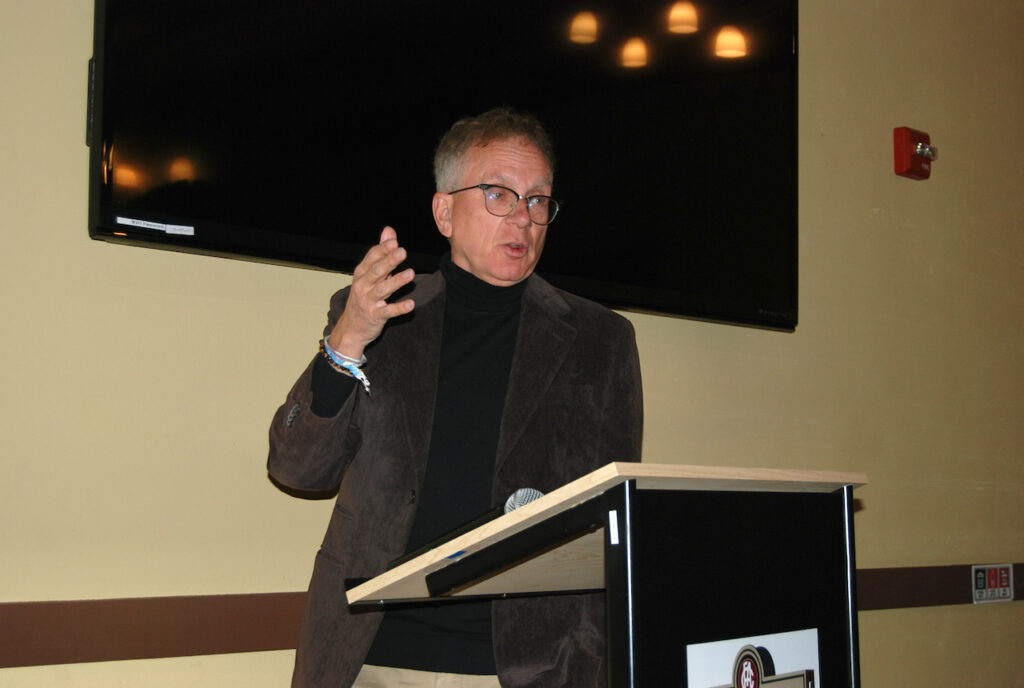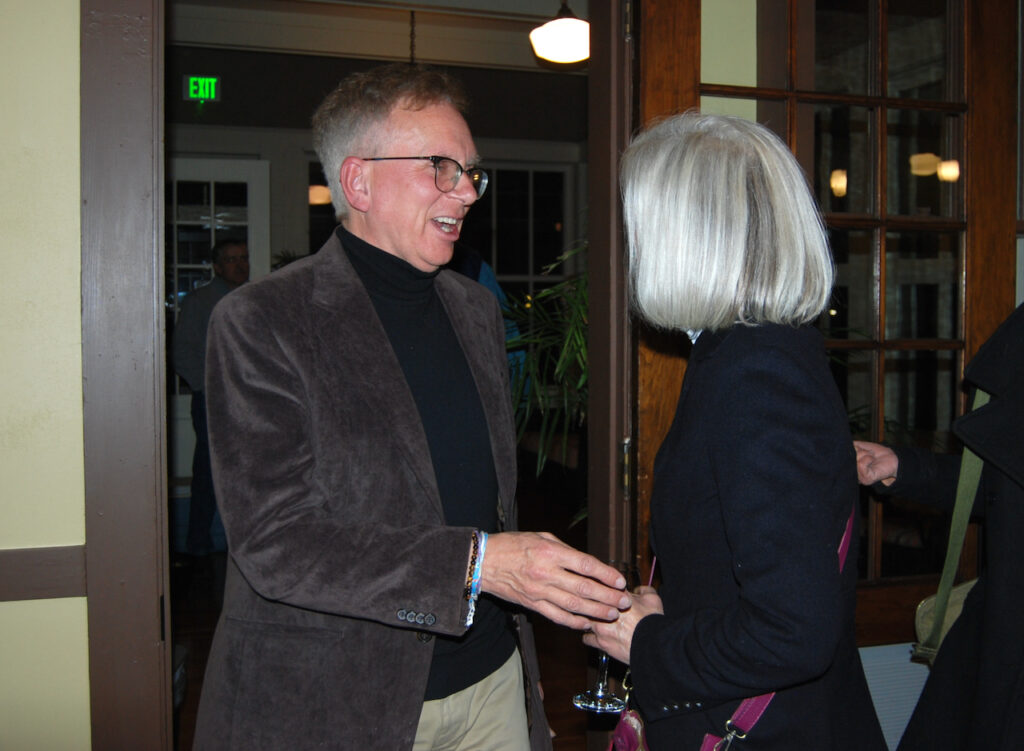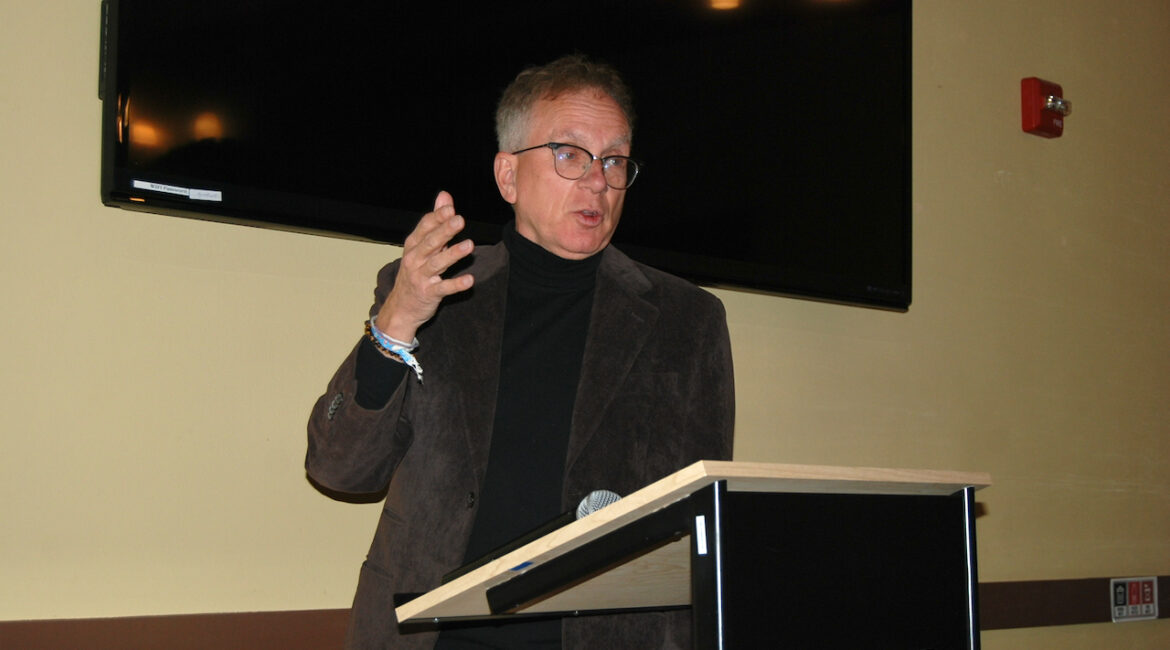By Kim McDarison
John Nichols, a progressive journalist and author, was the keynote speaker Sunday at a reception hosted by the Jefferson County Democratic Party called “Forward Together.”
The reception, which was attended by some 45 people, was described in a news release by its organizers as an opportunity to thank those participating as volunteers during the November election.
The event, which was free and open to the public, was held at the Fort Atkinson Club Community Center, Fort Atkinson.
Speaking for approximately 30 minutes, Nichols recapped outcomes of the November election and touched on strategies focused on maintaining party momentum through April of next year.
Also taking the podium Sunday was Wisconsin Supreme Court Candidate Everett Mitchell and Court of Appeals District 4 candidate Chris Taylor. The nonpartisan candidates circulated nomination papers during the reception.
Comments made Sunday by the two candidates will appear in an upcoming story.
Addressing event-goers in advance of the keynote speaker, Jefferson County Democratic Party Co-Chair Kelli Rowley called the reelections of Gov. Tony Evers and Attorney General Josh Kaul “huge wins for democracy and equality.”
She recognized and thanked State Rep. Don Vruwink for his work while running for a seat in Assemble District 33. Vruwink, who was in the audience, lost his race by a thin margin to Republican challenger Scott Johnson. Johnson will assume office in January, 2023.
“Don, we thank you for your years of service, not only on the Assembly floor, but for your many years in the classroom,” Rowley said.
Several members of the party who organized events, knocked on doors and advocated for Democratic candidates who ran in November also received words of appreciation from Rowley.
“We have amazing volunteers in Jefferson County,” she said.
She next introduced the keynote speaker.
During his remarks, Nichols called Vruwink “the absolute embodiment of a committed legislator who understands that his duty is to represent the people who elected him, and go out and hold his party banner high, even when they seek to gerrymander him out of the Legislature.”
He advocated for Taylor, who also was present, calling her “one of the finest state legislators we had in the State Legislature, an incredible judge in Dane County, now running for an appellate court position, rising up on the judicial side of the equation where we need great people.”
Nichols next spoke about a Supreme Court race which will appear first on a primary ballot in February, with the top two vote-getters advancing to the April election.
Four nonpartisan candidates have announced their intentions to run for a seat held by Justice Patience Roggensack who will not seek another term. They are Milwaukee County Circuit Court Judge Janet Protasiewicz, Dane County Circuit Court Judge Everett Mitchell, who was in attendance Sunday, former Justice Daniel Kelly, who served from 2016 to 2020, losing his seat to Justice Jill Karofsky, and Waukesha County Circuit Court Judge Jennifer Dorow.
“If a progressive wins a seat on the Supreme Court in April, it will be the most important election since the gubernatorial election — there’s a very real chance that we might actually even get fair maps in Wisconsin,” Nichols said.
Jefferson and Walworth counties
Nichols next focused on politics in Jefferson and Walworth counties, saying that he attended events held by both organizations earlier this year.
He described Jefferson County as a place in which Democratic Party leadership at the national and state levels, and national and statewide Democratic candidates, had once “given up.”
“They looked out and they said, ‘you know what? I don’t see any big city there. I don’t see anything that makes sense to me.’ And so they didn’t come and campaign, and they didn’t try. And the fact of the matter is you (Jefferson County Democrats) saw what happened, right? That disastrous election in 2016. When you saw those numbers collapse down. It wasn’t for lack of trying — I know many of you were trying — but there just wasn’t that lift, there wasn’t that level of commitment to it. Same thing happened in Walworth (county),” Nichols said.
He added: “I use Walworth County as a national example — a national example — of what happened to the Democratic Party, not in the last 50 years, not since Roosevelt, no, what happened to the Democratic Party in the last 10 years. Because the Democratic Party was literally carrying Jefferson County when Barack Hussein Obama was running for president of the United States — They did only carry it one time — not twice — but once — and came within a smidgen of carrying Walworth County — a county that voted for Barry Goldwater — right? The Democratic Party was on the march. This was huge. And then, 2016 comes along, and your nominee for president doesn’t even campaign in Wisconsin — didn’t even come here.”
He chastised the party’s decision to charge money for yard signs, saying: “Somebody putting out a yard sign, that’s a favor, right? They are doing you a service there and you do not charge them for that sign. They didn’t even know what a barn sign was. I mean the Democratic Party delinked for a time.”
Around the country, Nichols said, “that delinking put the Democratic Party out of competition. Look at Iowa. The Democratic Party is dead in Iowa. They could come back, but they just took their caucus away so it’s going to be rough.”
Describing events in 2016, and 2018, affecting the Democratic Party he said: “They lost up and down that statewide ballot — they lost people who’d been in office for 40 years in Iowa. You look at Ohio. Ohio fell apart. Ohioans, you know they thought they had chance at the Senate race. They got wiped out. So a lot of places in this upper Midwest Great Lakes region, the Democratic Party has gone into crisis, and it could have gone into crisis in Wisconsin.
“But grassroots activists — you people — people in this room, decided they weren’t going to let it happen. They were not going to let this party fall apart.”
Offering some thoughts about Ben Wikler, who was elected chairman of the Democratic Party of Wisconsin in 2019, Nichols said: “you got a chairman who is actually interested in reaching out. You’ve got some other people that were interested in reaching out. You’re got some candidates who are interested in starting to reach out to these counties that were forgotten and left behind.
“And something fundamental shifted.”
Last April, Nichols recalled, he attended a dinner with Democratic party members from both Jefferson and Walworth counties.
“I remember saying: ‘you don’t have to win Jefferson County — be nice if you did, you have done it, it’s happened — but you don’t have to win Jefferson County, but you have to hold your own. When you don’t hold your own here, Democrats cannot win statewide. It becomes impossible. And there’s all these fantasies: they keep saying, ‘oh, we’ll find another 10 votes in Dane County, right? There’s got to be some street in Madison that we haven’t knocked the doors of yet.’ I’m telling you, there isn’t.
“The fact of the matter is that you’re not going to get the votes you need to go across that line, you have got to go … out to rural, small towns and small cities in Wisconsin. That’s where the elections are won.”
Recalling past advice, Nichols said: “What I said was you’re going to have to do better here this time than you did in 2018.” He described 2018 as “a rough year.
“Democrats won all the statewide offices, but not by much; it was a smidgen, right? it was literally, they were waiting for those last precincts to come in. You’ve got to do better. And you did.
Sharing some statistics, Nichols said in 2018, in Jefferson County, Evers received 41.98% of the vote. In 2022, he received 43.2%.
“You got up a point and a half. Now people will say: ‘Oh, really? A point and a half up? Are you kidding? In Wisconsin where we decide presidential races by 20,000 votes?’” Nichols said, but, he added, “If we can do that across every county in the state, Democrats win. It’s as simple as that. You did your job here, and the only thing I’m going to kind of pick on you a little bit is Walworth did better. Walworth actually went up — they fell further behind, they were down at 38% — but they were up to 40.3%, they actually went up more than two points.”
Nichols continued: “Walworth and Jefferson counties did exactly what they needed to do. Now here’s a simple, fundamental reality: you look in western Wisconsin, some of those western Wisconsin counties, didn’t do it. You actually had some slippage in rural counties in western Wisconsin.”
He described voting decreases as “a problematic situation.”
Pointing again to countywide statistics, Nichols said: “Tony Evers’ percentage is about 42% here. That’s pretty good. So is Mandela Barnes. You got the whole ticket up there, right? Maybe a few votes one way or the other, but you got the full ticket up. You didn’t let somebody fall behind. That’s a big deal, because the rest of Wisconsin didn’t.”
He noted that Barnes lost his bid for a seat held by Sen. Ron Johnson by 26,000 votes.
Nichols cited unfair treatment of Barnes during the fall campaign cycle, saying: “Barnes was faced in 2022 with an absolutely racist campaign. It was a xenophobic, cruel, destructive campaign that was meant to diminish him in every possible way.”
Offering a description of tactics used by the opposition party against Barnes during the election, Nichols said: “They literally had mailings where they showed, you know, they have a fence, right? And somebody putting a ladder up to the fence who looked like Mandela Barnes. They darkened his skin, in case anybody didn’t know he was Black, right? I mean this, what they did in this campaign was reprehensible. It will be remembered for decades to come.”
Nichols described the tactics as effective, noting: “He (Barnes) fell down in the Marquette (Law School) poll about six points. I had everybody around me in the whole country, all these people in New York and Washington, they’re all saying: ‘Oh, wow, it’s all over there; you know Mandela Barnes, he’s finished.’”
Nichols said the campaign rebounded after the Democratic Party, which he described as having earlier “abandoned” the Barnes campaign, took a renewed interest. While the numbers were dropping, he said, the Barnes campaign was being outspent by its opponent by $6 million. Nichols said the money was used to fund “racist attack ads,” and was coming from “billionaires from out of state.”
According to Nichols, once the Democratic Party renewed its interest and money started coming back in, “Mandela Barnes could hold his own on those TV ads … he started to come back up. But more importantly, people didn’t give up here in Wisconsin on his campaign. I have people in New York and Washington saying: ‘Oh, that campaign’s over. He doesn’t have a chance.’
“If you watched the pundits on TV, they were saying: ‘Oh, I think the real action’s in Ohio. Well, with all due respect, Tim Ryan (a Democratic candidate who ran in November for a U.S. Senate seat) lost by about 300,000 votes — he got wiped out.”
The real action was in Wisconsin, Nichols said, adding that Barnes rebounded once he had party support and lost Wisconsin’s U.S. Senate seat by a mere 26,000 votes, calling Johnson’s lead a “smidgen.”
Of Barnes, Nichols said: “He climbed out of that hole that they put him in, and he got himself to the verge of victory. That’s a huge deal.
“The Democratic Party nationally failed,” he added.
Said Nichols: “They didn’t have the money there at the critical point. Had the money been there in September, and had he not fallen down those six points in the polls, Mandela Barnes would have been elected as a United States senator.
“There was also a failure on the pundits, right? the media. Everybody writing him off.”
He praised the members of the Jefferson County Democratic Party for not giving up on Barnes.
“Thank you for not listening to the pundits, not giving up, not believing that it wasn’t possible, because it was possible,” he said.
Value in rural communities
Looking at state Senate and Assemble races, Nichols said there were several rural Wisconsin districts where the National Democratic Party did not put the money in.
“They said: ‘Oh, we can’t win rural people, we can’t win small towns, we can’t win farm country, we cannot win small cities. They didn’t put the money in and they lost those seats.
“Do you know what Kevin McCarthy’s majority in the U.S. House is going to be? It’s going to be four seats.”
Nichols said he could point to four seats that the Democrats could have won if they would have offered the candidates more resources.
In those races, he said, candidates earned as much as 47-49% of the vote, and came “within a hair of winning.” All of the seat were in rural areas, he added.
“(They) would have won if the Democratic Party had recognized the power of rural regions in this country. And the fact of the matter is remember who lives in rural America, right? Twenty-five percent of our Black population lives in rural America; the majority of the Native American population lives in rural America. The boom populations in rural America are Latinx and Asian-American. This is the reality of rural America,” Nichols said.
He said rural areas also are populated with young people whom he described as having “given up on hope and possibility.”
Offering a strategy, he said: “You put resources into rural America who have a constituency that can actually win.”
Nichols advised party members at the local level to “be tougher” with the Democratic Party. He encouraged activists at the local level to communicate to party leaders that they have to “stop abandoning these rural areas,” and the candidates have to visit with local constituencies more often.
“Not that many years ago, there were pundits and politicians who were saying it’s over in Wisconsin for the Democratic Party,” he said.
He cited work done by members of the Jefferson County Democrats as “an absolute model for the whole state of Wisconsin. I don’t say this because I’m with you tonight, although I would say the same thing to Walworth (County Democrats), in all fairness, but these two counties are the model of what has to happen in Wisconsin. And that is hold your own in rural areas, to do what is necessary to keep bringing your total up. If you do that, the Democratic Party will never be finished in Wisconsin. It will actually grow and become dramatically stronger.”
2023, ‘the possible moment’
Nichols praised the Jefferson County group for its contribution in reelecting Tony Evers and holding enough Democratic seats in the Wisconsin Legislature to prevent a Republican majority that could override the governor’s veto power.
“You created a situation where now the Democratic Party, and more importantly, frankly, democracy, has a chance to win in 2023.
“2023 becomes the possible moment,” he said noting that there is a potential for the state to have a Supreme Court that is not Democratic, or liberal, but, he said, “actually respects democracy — that actually says that we’re going to look at each case as it comes to us, we’re going to decide based on facts, and the fact of the matter is, that voters ought to be able to have districts where there’s a fair fight, not a gerrymander that prevents the people from having the right to elect their representatives.”
He described the next election cycle as “really important,” telling those in attendance that if they could “finish this journey, we get our state back.”

Progressive journalist and author John Nichols addresses some 45 participates during a reception hosted by the Jefferson County Democratic Party, titled: “Forward Together.” The event was held Sunday at the Fort Atkinson Club Community Center. Kim McDarison photo.

Progressive journalist, author and keynote speaker at a reception hosted by the Jefferson County Democratic Party, John Nichols, visits Sunday with an event attendee. Kim McDarison photo.
This post has already been read 1926 times!
